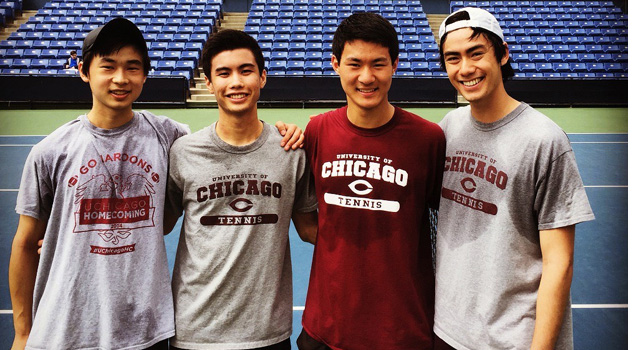
By Timothy Farrell
University Athletic Association
From four different regions, the 2015-16 University of Chicago men’s tennis freshmen class has come together as part of the most successful, and perhaps the closest, teams in program history.
“None of us really knew each other beforehand, which was weird because we all played national level tournaments, but had never met,” said Peter Leung.
What they did have in common was a desire to be challenged academically and to have the chance to vie for a national championship in tennis.
“My main goal was to find good people who loved tennis. You are pulled in so many directions at UC,” said head coach Jay Tee. “I could tell that these guys were like that.”
LATEST STORIES
“We came in as fresh as freshmen could be, isolated from each other due to perfectly spaced-out regions,” Leung added. “We became united under one common cause at the University of Chicago.”
Leung, along with Nick Chua, David Liu, and Luke Tsai, were all looking at other institutions as well in the recruiting process. Their road to Chicago:
Nick Chua

Chua, who grew up in San Carlos, California in the Bay Area, credits his parents for his interest in tennis, though he grew up playing multiple sports. His mother, whose mother was born in the Philippines and emigrated to the U.S., was the first person in the immediate family to play tennis. His father, who was born in Taiwan, taught himself the game, watching videos and top players like Andre Agassi and Pete Sampras.
In addition to tennis, Chua competed in baseball, basketball, and kung fu. “I was pretty advanced at kung fu by age eight, but at that point, I would have had to spar against 13-year-olds, who were much bigger, so I stopped at the time. I still know all the basics, but do not remember the intricacies.”
Baseball was the first team sport he stopped playing as his favorite part was batting and it didn’t happen nearly enough for him to stay interested. He watched Allen Iverson to learn how to dribble and shoot in basketball and found the local YMCA leagues too easy. Once he went to play in inner city leagues in San Francisco, he knew basketball would not be his sport either. “It was so physical in those city leagues and I realized these guys were far more gifted than I was. I found myself two steps behind them.”
One sport in which he found size was not a hindrance was tennis, particularly since he was already hitting the ball harder than a lot of bigger players. He started playing weekend novice tournaments at age nine and by age 10, was ranked in the top-50 in Northern California. He played bigger regional tournaments at age 12, but not many national tournaments until he was 15.
As he does now, Chua had a very strong two-handed backhand, which for those who have not seen it, can best be described as a baseball swing. “I was a lefty with a backhand, but no forehand,” he said. “I played all other sports right-handed and served right-handed until I was 13.
He had been hitting tennis balls since he was three years old and never needed anyone to coach him how to hit a backhand, but did need coaching and a time commitment to improve his forehand. “I got a lot better fast because I played a lot more tennis and had great coaches,” he commented. “Instead of going to clinics, I would always hit with older guys like Matt Soloman, who had recently graduated college. For two years, we would hit six hours a day during the summer and that helped me get a lot better.”
Once Soloman went to work a corporate job, Chua was trained by two University of Santa Cruz graduates who played under legendary coach Bob Hansen, Max Liberty-Point and then Matt Seeberger. “When I first started working with him, he was just entering high school, and could hit a backhand harder than anyone I had ever played against in my life,” said Seeberger, who won three NCAA Division III singles titles, three doubles titles, and two “Triple Crowns” (singles, doubles, and team title) at UCSC, “But the rest of his game was a mess.”
Chua credits Seeberger with bringing him from the regional to the national level and for changing the way he looked at food and drink. “He would have me drinking java juice. I remember one time telling him I was starving and he responded, ‘yah, but you are playing great!'”
“We had to dive into what he was putting into his body,” Seeberger stated. “He thought because he was thin that he could eat whatever he wanted. We also had to get his mind working on his behalf, instead of against. We had to get him believing he could play with the top players. He always had great respect for the best guys, but sometimes so much that it would completely freeze him from playing his level of tennis. Fortunately, he listened, and was able to grow into a player that knew he could do whatever he wanted with his tennis.”
Seeberger was confident Chua would continue to improve and was very coachable. “It didn’t take long for him to figure out what he needed to do to get better. And his work ethic made the process incredibly easy,” Seeberger said. “There was never anything I asked that he questioned. He did it with as much intensity as a professional athlete. His open mind made for a very real coaching relationship.”
Beyond the teacher-student relationship, Chua and Seeberger also developed a strong friendship. “We became really good friends and he did so many different things to make me better,” Chua remembered.
“I typically try to find ways to connect with my players beyond the court. I quickly learned Nick was a video game nerd, so it didn’t take long for us to start slaying other pimple-faced teenagers in Call of Duty and League of Legends together, joked Seeberger. “I worked with Nick quite a bit on the court, and it can be tricky to keep the sessions alive for extended periods unless you really enjoy sharing time together. So I knew it would be important that we had something besides tennis to talk about and bond over to keep things fresh and exciting. Needless to say, it didn’t take long for him to start teaching me how to properly gank (a surprise attack on an enemy champion in League of Legends).”

When Seeberger moved on to play professional tennis, he connected Chua with former professional player Julio Peralta, who had been ranked as high as 212th in the world before injuries forced him to leave the tour. “Julio helped my game an insane amount between age 17 and college,” Chua said. “We traveled to Germany the summer before I went to UC and we played club tennis. I was a training partner and even defeated someone in the ATP (Association of Tennis Professionals) top-200 6-2, 6-3.”
“My first impresson of him was a really nice kid with adorable parents, willing to work very hard with a lot of potential but at the same time very nervous,” Peralta said. “He was a hard worker, intelligent with a unique and dangerous backhand. He was very coachable and most importantly, a great person.”
Chua had to battle back from missing three months due to mononucleosis after his junior year in high school, but Peralta helped him regain his strength and improve his game. “First, I gave him confidence to believe in his game, then we worked on some strokes, mainly his forehand, serve and volleys. After that, we worked on how to apply all of that into a strategy and game plan. It was one of the best times during my coaching period, I don’t just feel I helped him quite a bit in his game, but also that I got to know an awesome kid (and family), and now a good friend.”
Once his college search began, Chua focused on the strongest academic schools. “I knew I wanted to go to a good school. I took all the honors and AP (Advanced Placement) courses in high school, but I being in those classrooms, I was so disinterested,” he stated. “There was simple material we couldn’t move past and I got discouraged. Part of it was that from pre-Kindergarten through middle school, I went to a different type of school, where there were no grades, and I discovered that I loved learning. I knew learning was important to me.”
He looked into Ivy League schools as well as Massachusetts Institute of Technology and Stanford University. His first choice was Yale University, but an issue with a foreign recruit cost him a spot there and he also lost a spot at Harvard University to another unique situation. Then he visited Chicago. “I really loved my visit to UC, it fit me well, and Jay was willing to take me,” he recalled.
With an interest in economics, Chua knew he would be challenged at any of the schools he looked at. “I knew I didn’t want to get into medicine or engineering. Economics seemed like the most interesting thing, but I don’t know if I really knew what I was getting myself into at first with that major at UC.”
“Having Nick commit first made it a lot easier to get the other three,” said Tee. “I remember getting on the phone to Dave (Liu) and telling him that Nick had just committed and that pretty much made up Dave’s mind that he wanted to be a part of what we were building.”
Peter Leung
Leung was born and raised in Houston, Texas, where his parents moved to earn their master’s degrees. His dad, who was born in Hong Kong during British Colonial rule, was a ball boy at the biggest club in his hometown and got to see professional tennis players play when they were in town. His mother, who is from Shanghai, picked up an interest in the game from her husband and they passed the love of the game on to Peter.
“My dad kind of taught himself to play,” Leung said. “He did a pretty decent job stroke-wise with a classic flat forehand and a stiff one-handed backhand that comes relatively fast.”
At age seven, Leung started hitting balls around with his father and started in a junior program. His progression was fast and he moved on to focusing on the sport in an academy for a couple hours every day after school and playing tournaments on weekends.

Tennis was one of many activities for Leung’s active childhood, ranging from multiple sports to playing piano. “I started playing when I was six and kept on taking lessons and practicing until I was a junior in high school,” he remarked. “I stopped taking formal lessons, but I still play from time to time when I see a piano. A new piano actually kind of excites me because the old cottage piano I had at home has been worn down and doesn’t sound as full as the baby grands scattered over the UChicago campus or wherever else I see one.”
Peter Leung High School Piano Recital (Note: Watch until the end!)
Leung, who is attempting to start a piano club RSO (Recognized Student Organization) on campus, has played such classics as Beethoven’s Für Elise, Chopin’s Polonaises, and Romantic-era pieces by Rachmaninoff. “I’m no prodigy, but if you give me a couple months to focus on a complicated piece, I can usually play it well,” he said. “Piano is the kind of a thing I do on my own time for fun. I bought a weighted keyboard and it sits in my apartment. Luke (Tsai) and I play it from time to time and we have even attempted some duets.”
He also began swimming at age six and went on to win a gold medal in the backstroke at a statewide competition, but stopped competing at age 10 to focus more on tennis. He made a brief foray into soccer, though mostly remembers playing goalie in recess “because I was like 10 feet tall in elementary school,” he quipped.

He competed in football and track & field in the seventh and eighth grades with varying levels of success. “I was about 5’-10” in junior high. I didn’t really have any football knowledge, but I had the size and some strength,” Leung remarked. After a year at wide receiver, which included no receptions and all three passes thrown his way being intercepted, he was moved to offensive tackle.
After discovering the 200-meter dash and the hurdles weren’t suited to him, Leung qualified for the district championship in the 1,600-meter run and fared well in the long jump in high school. His most memorable track moment was running the 400 meters just two events after having run the 1,600. “I beat my best friend I had never beaten before because he decided to eat nachos right before the race,” he commented. “Then I had to run the terrible 400 right after that exhausting mile run. I don’t think I have ever been more tired.”
Using his size advantage, Leung focused on a power game in tennis. “I started developing into that guy who would hit really hard and heavy from the baseline, but miss everything for hitting too hard,” he recalled. “My dad would always tell me to hit the ball as hard as I could because when I got older, it would be good for me. He was primarily focused on the future and me hitting hard. I had good strokes, but very little game plan when it came to playing matches. I would hit big and outhit the older kids, but I would also have really bad losses because people who were smart enough to hit six balls in the court would beat me.”
His breakthrough came in the 12-year-old age group when he defeated the top three seeds to win a sectional title. That got him ranked ninth in the state and he continued to be ranked in the top-10 the balance of his junior career. He capped off his junior career by winning the state title in his senior year of high school, the same title his current teammate David Liu won as a freshman.

When it came to his college search, Leung was focused on the Ivy League schools at first, particularly Harvard, Yale, Princeton, and Columbia. “I overestimated how good my tennis abilities were,” he remembered. “Princeton thought I was a good fit, but they had better players coming in. I knew I could get into Columbia, where my sister went and was close to the coach, but the coach could not guarantee me a spot.”
Denver University offered Leung a scholarship, but he was looking for a rigorous academic school, and he wanted to go to school out of state so Rice University, located in Houston, was not an option. “I didn’t want to just go to a school and not play tennis because it was such a big part of my life,” Leung stated. “I talked a bit more to Coach Tee. I wanted to go to the best school academically that I could. That was the priority and I felt like UChicago would fit that role with its rigorous academics and I could play some tennis there as well.”
“At first I didn’t think Peter was all that interested in Chicago but once I met him in person I knew he would be a good fit for us,” Tee stated. “I just had to convince him of that. Out of the the four guys in the class I definitely spent the most time talking with Peter and his parents. There were times when I didn’t think it was going to work out but I’m really glad it did.”
His official visit to the Chicago campus sealed the decision for Leung. “Everyone in the dorms seemed so friendly and open to random conversation,” he said. “Some of the students at Denver seemed pretty down and I felt that UChicago was more vibrant. I didn’t do too much research into what colleges I wanted to go to. I just kind of thought about tennis and the overall academic rigor. I made the right decision. UChicago has pushed me academically a lot further than I thought it would and I have been able to continue with a great experience in tennis.”
Although he had never met his soon-to-be teammates when he began his college search, Leung was aware of two of them. “I knew of David because he was in Texas for part of his junior career and I knew of Nick because I saw his ugly strokes once at Kalamazoo for the (USTA) Boys Nationals,” he joked.
David Liu
Liu grew up as the son of immigrant parents from China, who met in college and moved to Nebraska for graduate school. “My dad is a few years older than my mom and at one time was her English T.A. (Teacher’s Assistant),” he laughed. “My mother likes to remind him that she speaks much better English than he does now.”
“My dad was super into tennis and got me started in a beginner’s clinic around age seven,” he recalled. “I remember them telling me I had great coordination and a good backhand, but I don’t know if that was just a sales pitch.”
By the time he was eight years old, Liu had a coach and found success quickly in the sport. “I was training with really good players so that helped me,” he recalled. “I was bigger than most kids when I was younger.”
He won three National Open tournaments in junior tennis and reached a #2 national ranking. Liu also represented Missouri Valley in the Junior Davis Cup.

He spent the eighth and ninth grades in Texas at the John Newcombe Tennis Academy in New Braunfels, Texas. There, he faced players like Jackson Withrow, who won three Nebraska state titles and went on to play at NCAA Division I Texas A&M University.
In his freshman year of high school, Liu captured the Texas state title (three years later, Leung won the same championship) before returning to Nebraska.
He continued to excel, winning the state title each of his three years back in Nebraska, finishing 117-1 in his high school career. He remembers the one loss well. “We went to Chick-fil-A and my freshman teammate was buying me all this food and a milkshake to kiss up to me,” he stated. “I was a senior and thought I had nothing to worry about in my match with him. Then I got out on the court in the 105-degree heat. I ended up throwing up and losing. I did beat him every other time we played.”
Although proud of his accomplishments in his home state, Liu recognized that the Texas state title was more impressive. “It was nice to have family and friends in Nebraska, but strictly tennis-wise, it was better being in Texas,” he commented. “In Texas, they really do it right. It is full of really good players.”
Liu was equally committed to his academics through high school. “My parents always pushed me to do well in school because they knew it was important to get into a good school if long-term tennis plans didn’t work out,” he remarked. “All through juniors, I knew if I wasn’t going to go pro, I wanted to use tennis to get into a school I couldn’t otherwise.”
It was through academics that Liu earned a fifth state title, this time as part of a team that eventually finished second of more than 3,000 teams at the National Economics Challenge. He was invited to be part of the team by his tennis teammate and close friend Raymond Thai, who was already a big fan of Liu. “When David sees he can make a difference, he always does what is needed to help the team or the community,” he said. “In the Econ Challenge, he would be the one to say, ‘Let’s have a study session and let’s look at this.’ He always puts the team first.”

Liu was a household name when Thai, two years his junior, started out in tennis. “He was already a big name in Omaha. We knew we would eventually be going to the same high school and we started to become close through tennis,” said Thai, now a freshman at Stanford. “David would always help give the younger guys extra practice and we would go out for food together. One of the best things he taught me was when he said, ‘You can learn the technique of hitting a shot, but if you don’t know how to apply that, you don’t know how to win.’ He showed me how to make adjustments, how to win.”
Their friendship has blossomed into partnerships as well as they have an investment fund together and developed Liu-Thai Tennis, which helps make tennis instruction and support accessible to those in Omaha who may otherwise not be able to afford it.
“We know that it can be hard to break in to tennis if you are not from a tennis family or rich,” Liu stated. “We saw a need for that and took it on during high school. We gave lessons for those who couldn’t afford $70 per hour and taught it at the high school.”
Eventually, the tandem grew the idea to an annual tennis tournament, bringing beginners to try their hand at the sport with used equipment. “One time we played a high school team from the inner city and they were switching off racquets in between matches. We came up with 40 old racquets as a donation drive for schools and programs that lacked funding.”
“Liu-Thai Tennis was a natural tradition,” Thai added. “Omaha provided a place for me and older guys really helped me out, taught me work ethic and motivation, and helped me make a lot of great friendships. We wanted to get a lot of others involved. We taught together and had a lot more students instead of just 1-on-1.”
For some time, Thai thought he would be joining Liu at Chicago, but the combination of his interest in computer science and the location made Stanford a good fit for him. He did, however, follow in his footsteps as captain of the high school team. “When I became captain, I looked to him as an example as to what I should do: put the team first, put in the extra work, and make sure everyone was accounted for and had their voice heard,” Thai commented. “He has always been a role model for me and I have learned from his leadership.”
With his college search focused on Stanford, Ivy League schools, and Chicago, Liu knew that he would find the academic rigor he was looking for. “Once I had really gotten involved in economics, UC was the next step since it has the best economics program in the world,” he stated. “In terms of tennis, would I rather be toiling away (at a Division I school) trying to play at a high spot or trying to win a national championship at one of the top schools in the country?”
“Dave initially called me around the same time Nick did but I didn’t really get the sense that he was seriously considering Chicago,” Tee remembered. “I think he had his mind set that he was going to Stanford and once he found out he wasn’t part of Stanford’s plans, he looked more intently at UC. When he called back again a few months later I was still skeptical and I asked him, ‘You didn’t seem that interested when we spoke before, what’s changed?’ We ended up having a really good conversation which lead to him visiting and having a really good time.”
Luke Tsai
Tsai is the son of Taiwanese immigrants and had lived in three states by the time he turned 10. He was born in Mississippi and his family moved to Ames, Iowa before he was one year old.
“I had a lot of great childhood memories in Ames,” he recalled. “I remember being a very active child because I would always be running around outside or playing different sports. Ames was a very nice small town to live in because the people were always so nice and the community seemed very tight-knit. I recall that in my typical summer day, I would ride my bike around the neighborhood, play on the swing set, catch fireflies, and roast marshmallows over a fire.”
He grew up playing a number of sports with soccer being his favorite until he was 12. He also competed in gymnastics, swimming, ice skating, basketball, and ping pong with his father being the first one to introduce him to tennis. “He was really into it and liked watching Andre Agassi,” Tsai remembered. “He would record the grand slam matches on television and sometimes we would go to the park and hit from the service line.”

He became far more interested in tennis when the family moved to its current home of Mason, Ohio, where he started taking private lessons. “I think I just naturally started to get better by playing more,” he said. “Once I reached a certain level, it became important to play in higher-level tournaments and practice with stronger players to improve.”
Tsai credits two of his junior coaches with having the most impact on his game, the first being Champy Halim. “He really taught me to be creative with my game and to use my touch, so I learned to hit angles, slices, and drop shots.”
“I remember how easily he picked up on new things that I introduced to him,” said Halim. “He was small at the time, but he had such a great attitude toward the whole learning process. He has amazing hand-eye coordination so learning to hit slices and drop shots was not a problem for him.”
Halim remembers Tsai’s biggest improvement coming when they started playing challenging games against one another, which not every student was equipped for. “My style was to always try to disrupt my opponent’s rhythm and he benefited from being on the opposite site,” he stated. “He got better because of his great attitude and embracing challenges. Too many other players at that age would get discouraged and stop trying. I remember the battles we had playing just half the court, where we had to use drop shots, lobs, and different spins in order to win a point within that smaller space.”
The game Halim saw then is still prevalent today. “He has the ability to track down balls and discern the types of spins and speed on the shots,” he remarked. “I was blessed to get a chance to train him even if it was just for a short time.”
The other junior coach that impacted Tsai’s game the most was his current hometown coach Roland Lutz. “He has helped me develop an aggressive game with more power.”
Lutz has been coaching Tsai for more than 10 years. “He is very competitive and has a well-rounded game,” Lutz said. “About age 13 or 14, something clicked with him and he really got focused. From that point on, I have never had to push him to get better.”
“I would call his change of mindset at that age transformational,” Lutz added. “He started to do things like staying longer for practice. The combination of him wanting to be good and how smart he is helped him to realize what he needed to do and that started with his work ethic.”

Lutz still works with Tsai during the summer and winter breaks. “At this point, I just watch him play and see if there is anything that needs to be tweaked, little things here and there that may help him when he goes back,” he said.
With his major of biological sciences with a specialization in neuroscience, Tsai’s college search naturally focused on strong academic institutions. “Similar to my teammates, I looked at a few Ivy League schools and a mix of nearby Division I and Division III schools,” he commented. “In the end, UChicago was my best choice and one that I am glad I made. Obviously it is one of the top-ranked universities, but another factor was the possibility of becoming the first team in school history to win a team NCAA championship.”
“I noticed Luke having some really good results so I reached out to him and there was mutual interest,” Tee said. “He was so quiet on his visit that I couldn’t really get a read on him. I knew he had already visited a few other schools and was getting a lot of pressure to commit elsewhere. The most difficult part of recruiting Luke is that other coaches were putting deadlines on him, but I

couldn’t give him a definitive answer until he applied and went through the admissions process. Luckily for us, he didn’t let someone else make his decision for him and he ended up at Chicago.”
“I think Division I was ultimately where he wanted to be, but there are a lot of good D2 and D3 schools that are strong academically,” Lutz said. “The quality of academics at Chicago was important to him. It turned out to be a perfect fit for him.”
AsAmNews is an all-volunteer effort of dedicated staff and interns. You can show your support by liking our Facebook page at www.facebook.com/asamnews, following us on Twitter, sharing our stories, interning or joining our staff.



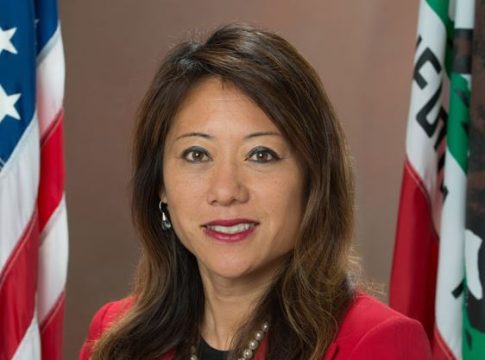
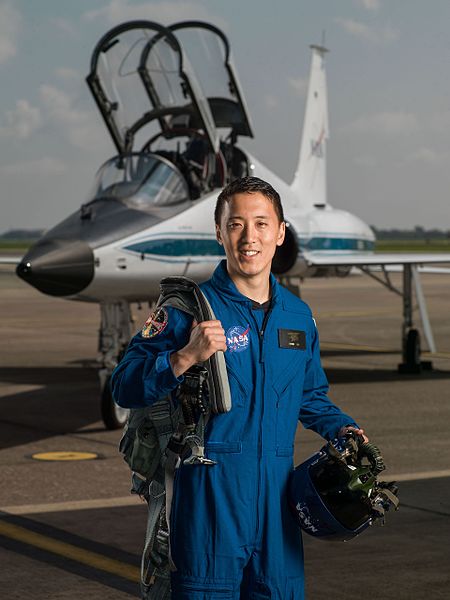
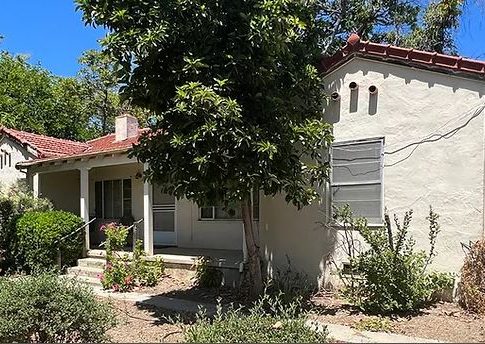
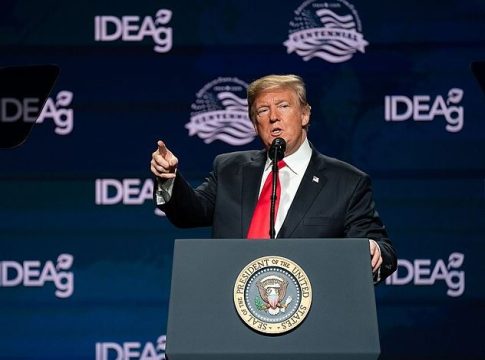
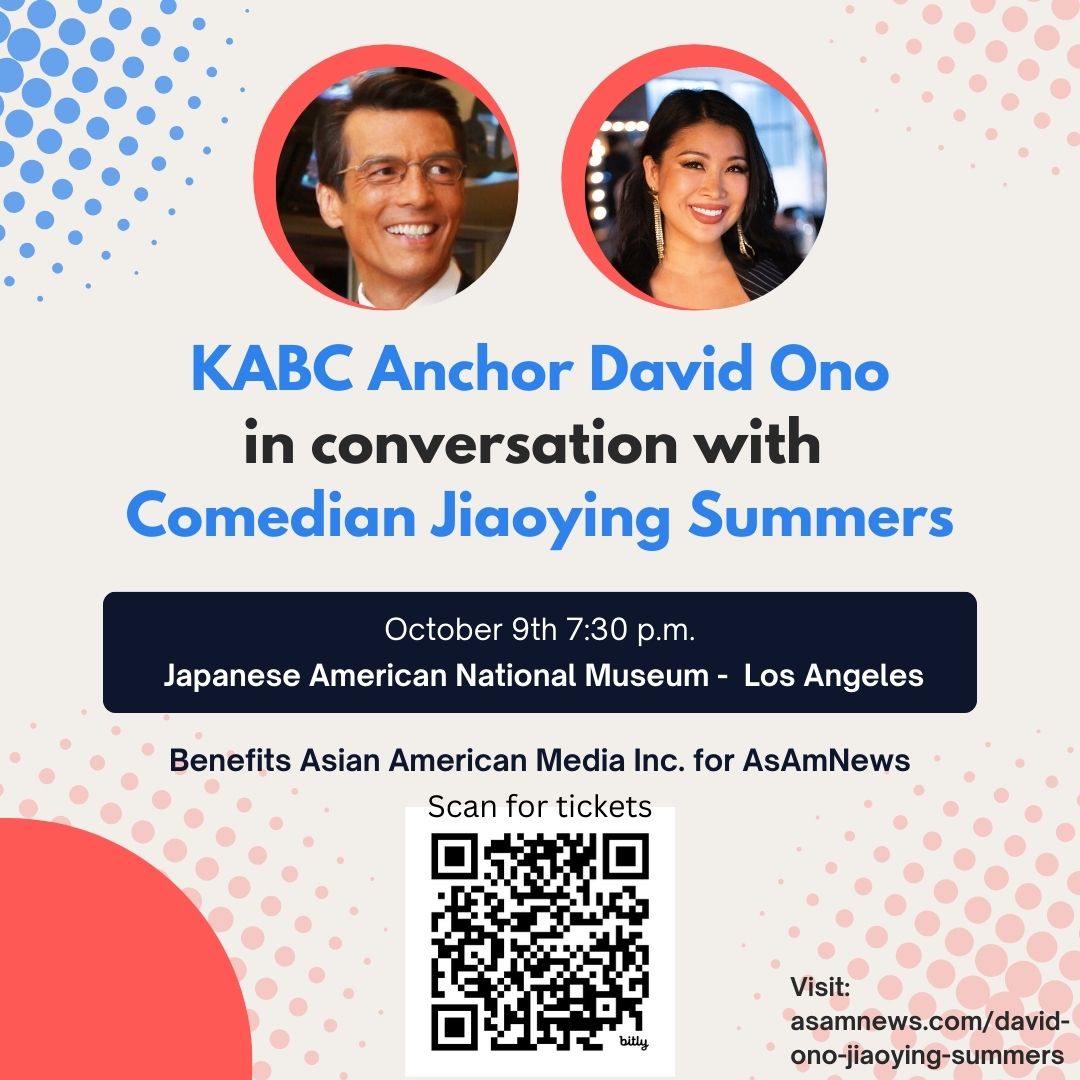


RE: The Year the Univ of Chicago tennis team recruited four Asian American standouts: What a group of outstanding young athletes and students!
Way to go! Hope you will win a NCAA championship before you graduate from UC!
Brian Liu